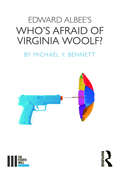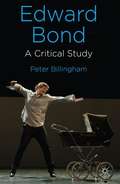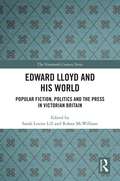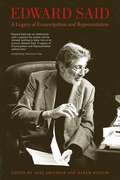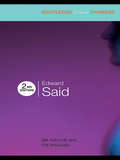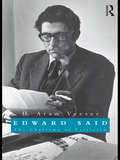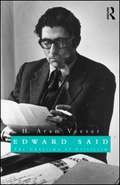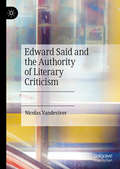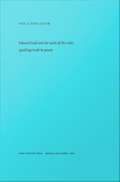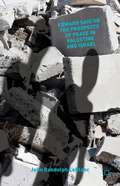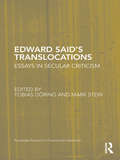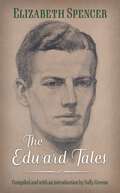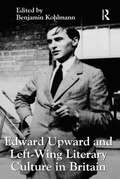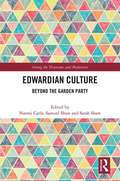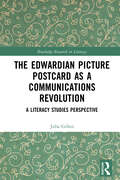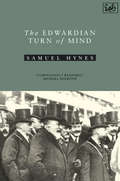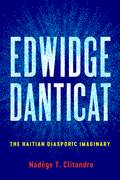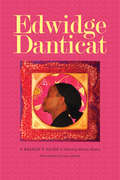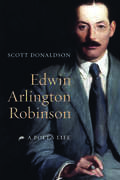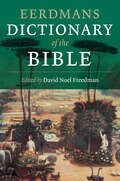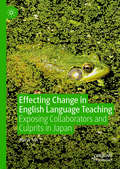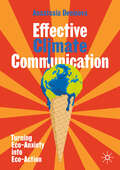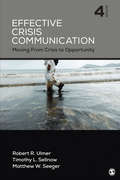- Table View
- List View
Edward Albee's Who's Afraid of Virginia Woolf? (The Fourth Wall)
by Michael Y. BennettEdward Albee’s Who’s Afraid of Virginia Woolf? shocked audiences and critics alike with its assault on decorum. At base though, the play is simply a love story: an examination of a long-wedded life, filled with the hopes, dreams, disappointments, and pain that accompany the passing of many years together. While the ethos of the play is tragicomic, it is the anachronistic, melodramatic secret object—the nonexistent "son"—that upends the audience’s sense of theatrical normalcy. The mean and vulgar bile spewed among the characters hides these elements, making it feel like something entirely "new." As Michael Y. Bennett reveals, the play is the same emperor, just wearing new clothes. In short, it is straight out of the grand tradition of living room drama: Ibsen, Chekhov, Glaspell, Hellmann, O’Neill, Wilder, Miller, Williams, and Albee.
Edward Bond: A Critical Study
by Peter BillinghamThis new study of one of Britain's greatest modern playwrights represents the first major, extended discussion of Edward Bond's work in over twenty years. The book combines rigorous and stimulating analysis and discussion of Bond's plays and ideas about drama and society. For the first time, there is also discussion of selected plays from his later, post-2000 period, including Innocence and Have I None, alongside explorations of widely studied plays such as Saved.
Edward Lloyd and His World: Popular Fiction, Politics and the Press in Victorian Britain (The Nineteenth Century Series)
by Sarah Louise Lill Rohan McWilliamThe publisher Edward Lloyd (1815-1890) helped shape Victorian popular culture in ways that have left a legacy that lasts right up to today. He was a major pioneer of both popular fiction and journalism but has never received extended scholarly investigation until now. Lloyd shaped the modern popular press: Lloyd's Weekly Newspaper became the first paper to sell over a million copies. Along with publishing songs and broadsides, Lloyd dominated the fiction market in the early Victorian period issuing Gothic stories such as Varney the Vampire (1845-7) and other 'penny dreadfuls', which became bestsellers. Lloyd's publications introduced the enduring figure of Sweeney Todd whilst his authors penned plagiarisms of Dickens's novels, such as Oliver Twiss (1838-9). Many readers in the early Victorian period may have been as likely to have encountered the author of Pickwick in a Lloyd-published plagiarism as in the pages of the original author. This book makes us rethink the early reception of Dickens. In this interdisciplinary collection, leading scholars explore the world of Edward Lloyd and his stable of writers, such as Thomas Peckett Prest and James Malcolm Rymer. The Lloyd brand shaped popular taste in the age of Dickens and the Chartists. Edward Lloyd and his World fills a major gap in the histories of popular fiction and journalism, whilst developing links with Victorian politics, theatre and music.
Edward Said: A Legacy of Emancipation and Representation
by Adel Iskandar and Hakem RustomEdward W. Said (1935–2003) ranks as one of the most preeminent public intellectuals of our time. Through his literary criticism, his advocacy for the Palestinian cause, and his groundbreaking book Orientalism, Said elegantly enriched public discourse by unsettling the status quo. This indispensable volume, the most comprehensive and wide-ranging resource on Edward Said’s life and work, spans his broad legacy both within and beyond the academy. The book brings together contributions from thirty-one luminaries—leading scholars, critics, writers, and activists—to engage Said’s provocative ideas. Their essays and interviews explore the key themes of emancipation and representation through the prisms of postcolonial theory, literature, music, philosophy, and cultural studies.Contributors: Bill Ashcroft, Ben Conisbee Baer, Daniel Barenboim, Timothy Brennan, Noam Chomsky, Denise DeCaires-Narain, Nicholas Dirks, Marc H. Ellis, Rokus de Groot, Sabry Hafez, Abdirahman A. Hussein, Ardi Imseis, Adel Iskandar, Ghada Karmi, Katherine Callen King, Joseph Massad, W. J. T. Mitchell, Laura Nader, Ilan Pappe, Benita Parry, Rajagopalan Radhakrishnan, Jahan Ramazani, Jacqueline Rose, Lecia Rosenthal, Hakem Rustom, Avi Shlaim, Ella Habiba Shohat, Robert Spencer, Gayatri Chakravorty Spivak, Anastasia Valassopoulos, Asha Varadharajan, Michael Wood
Edward Said (Routledge Critical Thinkers)
by Bill Ashcroft Pal AhluwaliaEdward Said is perhaps best known as the author of the landmark study Orientalism, a book which changed the face of critical theory and shaped the emerging field of post-colonial studies, and for his controversial journalism on the Palestinian political situation. Looking at the context and the impact of Said's scholarship and journalism, this book examines Said's key ideas, including: the significance of 'worldliness', 'amateurism', 'secular criticism', 'affiliation' and 'contrapuntal reading' the place of text and critic in 'the world' knowledge, power and the construction of the 'Other' links between culture and imperialism exile, identity and the plight of Palestine a new chapter looking at Said's later work and style This popular guide has been fully updated and revised in a new edition, suitable for readers approaching Said's work for the first time as well as those already familiar with the work of this important theorist. The result is the ideal guide to one of the twentieth century's most engaging critical thinkers.
Edward Said: The Charisma of Criticism
by H. Aram VeeserThis insightful critical biography shows us an Edward Said we did not know. H. Aram Veeser brings forth not the Said of tabloid culture, or Said the remote philosopher, but the actual man, embedded in the politics of the Middle East but soaked in the values of the West and struggling to advance the best European ideas. Veeser shows the organic ties connecting his life, politics, and criticism. Drawing on what he learned over 35 years as Said's student and skeptical admirer, Veeser uses never-before-published interviews, debate transcripts, and photographs to discover a Said who had few inhibitions and loathed conventional routine. He stood for originality, loved unique ideas, wore marvelous clothes, and fought with molten fury. For twenty years he embraced and rejected, at the same time, not only the West, but also literary theory and the PLO. At last, his disgust with business-as-usual politics and criticism marooned him on the sidelines of both. The candid tale of Said's rise from elite academic precincts to the world stage transforms not only our understanding of Said—the man and the myth—but also our perception of how intellectuals can make their way in the world.
Edward Said: The Charisma of Criticism
by H. Aram VeeserThe author brings about the actual man in Edward Said -- embedded in the politics of the Middle East but soaked in the values of the West and struggling to advance the best European ideas.
Edward Said and the Authority of Literary Criticism
by Nicolas VandeviverThis book examines the earliest writings of Edward Said and the foundations of what came to be known as postcolonial criticism, in order to reveal how the groundbreaking author of Orientalism turned literary criticism into a form of political intervention. Tracing Said’s shifting conceptions of ‘literature’ and ‘agency’ in relation to the history of (American) literary studies in the thirty years or so between the end of World War II and the last quarter of the twentieth century, this book offers a rich and novel understanding of the critical practice of this indispensable figure and the institutional context from which it emerged. By combining broad-scale literary history with granular attention to the vocabulary of criticism, Nicolas Vandeviver brings to light the harmonizing of methodological conflicts that informs Said’s approach to literature; and argues that Said’s enduring political significance is grounded in his practice as a literary critic.
Edward Said and the Work of the Critic: Speaking Truth to Power
by Paul A. BovéFor at least two decades the career of Edward Said has defined what it means to be a public intellectual today. Although attacked as a terrorist and derided as a fraud for his work on behalf of his fellow Palestinians, Said's importance extends far beyond his political activism. In this volume a distinguished group of scholars assesses nearly every aspect of Said's work--his contributions to postcolonial theory, his work on racism and ethnicity, his aesthetics and his resistance to the aestheticization of politics, his concepts of figuration, his assessment of the role of the exile in a metropolitan culture, and his work on music and the visual arts. In two separate interviews, Said himself comments on a variety of topics, among them the response of the American Jewish community to his political efforts in the Middle East. Yet even as the Palestinian struggle finds a central place in his work, it is essential--as the contributors demonstrate--to see that this struggle rests on and gives power to his general "critique of colonizers" and is not simply the outgrowth of a local nationalism. Perhaps more than any other person in the United States, Said has changed how the U. S. media and American intellectuals must think about and represent Palestinians, Islam, and the Middle East. Most importantly, this change arises not as a result of political action but out of a potent humanism--a breadth of knowledge and insight that has nourished many fields of inquiry. Originally a special issue of boundary 2, the book includes new articles on minority culture and on orientalism in music, as well as an interview with Said by Jacqueline Rose. Supporting the claim that the last third of the twentieth century can be called the "Age of Said," this collection will enlighten and engage students in virtually any field of humanistic study. Contributors. Jonathan Arac, Paul A. Bov, Terry Cochran, Barbara Harlow, Kojin Karatani, Rashid I. Khalidi, Sabu Kohsu, Ralph Locke, Mustapha Marrouchi, Jim Merod, W. J. T. Mitchell, Aamir R. Mufti, Jacqueline Rose, Edward W. Said, Gayatri Chakravorty Spivak, Lindsay Waters
Edward Said On The Prospects Of Peace In Palestine And Israel
by John Randolph LeblancJohn Randolph LeBlanc examines the political oeuvre of critic and activist Edward Said and finds that Said preferred "reconciliation" to segregation in Palestine/Israel. LeBlanc argues that Said's criticism speaks to the importance of negotiating the troubling, proximate, and unsettling presence of our most perplexing others.
Edward Said's Translocations: Essays in Secular Criticism (Routledge Research in Postcolonial Literatures)
by Mark Stein Tobias DöringWorking with processes of translocation enabled Edward Said to point out interdependence and complementarity across geographical borders and disciplinary boundaries while recognizing cultural difference and the distinct historical experiences of colonizer and colonized. This book brings into focus Said’s politics of reading, from his literary criticism in English to his political columns in Arabic. The international contributors—from Britain, Egypt, France, Germany, India, Switzerland, and the United States—investigate his intellectual legacies without necessarily identifying themselves with the critical positions these involve. Instead of treating his work as a unitary theoretical system, the various arguments explored offer a critical assessment of those situations in which his writing has entered into a productive relationship with other theoretical positions and interlocutors. The collection considers location, which has always been a central category in and for Said’s writing; readings, which designates the acts by which, according to Said, the world comes to be constituted; and legacies, which pertains to the many fields across the boundaries of established academic disciplines that have taken up Said’s challenges. The critical positions visited in this book include critical and cultural theory, postcolonialism, literary studies, theatre and performance studies, and visual and music studies.
The Edward Tales
by Elizabeth SpencerIn conferring upon Mississippi native Elizabeth Spencer (1921–2019) the 2013 Rea Award for the Short Story, the jury said that at the then age of ninety-two, she “has thrived at the height of her powers to a degree that is unparalleled in modern letters.” Over a celebrated six-decade career, Spencer published every type of literary fiction: novels and short stories, a memoir, and a play. Like her best-known work, The Light in the Piazza, most of her narratives explore the inner lives of restless, searching southern women. Yet one mercurial male character, Edward Glenn, deserves attention for the way he insists on returning to her pages. Speaking of Edward in unusually personal terms, Spencer admitted a strong attraction to his type: the elusive, intelligent southern man, “maybe an unresolved part of my psyche.” In The Edward Tales, Sally Greene brings together the four narratives in which Edward figures: the play For Lease or Sale (1989) and three short stories, “The Runaways” (1994), “Master of Shongalo” (1996), and “Return Trip” (2009). The collection allows readers to observe Spencer’s evolving style while offering glimpses of the moral reasoning that lies at the heart of all her work. Greene’s critical introduction helpfully places these narratives within the context of Spencer’s entire body of writing. The Edward Tales confirms Spencer’s place as one of our most beloved and accomplished writers.
Edward Upward and Left-Wing Literary Culture in Britain
by Benjamin KohlmannOffering the first book-length consideration of Edward Upward (1903-2009), one of the major British left-wing writers, this collection positions his life and works in the changing artistic, social and political contexts of the twentieth and early twenty-first centuries. Upward’s fiction and non-fiction, from the 1920s onwards, illustrate the thematic and formal richness of left-wing writing during the twentieth-century age of extremes. At the same time, Upward’s work shows the inherent tensions of a life committed at once to writing and to politics. The full range of Upward’s work and a wealth of unpublished materials are examined, including his early fantastic stories of the 1920s, his Marxist fiction of the 1930s, the extraordinary semi-autobiographical trilogy The Spiral Ascent and his formally and thematically innovative later stories. The essays collected here reevaluate Upward’s central place in twentieth-century British literary culture and assess his legacy for the twenty-first century.
Edwardian Culture: Beyond the Garden Party (Among the Victorians and Modernists)
by Samuel Shaw Sarah Shaw Naomi CarleEdwardian Culture: Beyond the Garden Party is the first truly interdisciplinary collection of essays dealing with culture in Britain c.1895-1914. Bringing together essays on literature, art, politics, religion, architecture, marketing, and imperial history, the study highlights the extent to which the culture and politics of Edwardian period were closely intertwined. The book builds upon recent scholarship that seeks to reclaim the term ‘Edwardian’ from prevalent, restrictive usages by venturing beyond the garden party – and the political rally – to uncover some of the terrain that lies between. The essays in the volume – which deal with both famous writers such as J. M. Barrie and Arnold Bennett, as well as many lesser-known figures – draw attention to the nuanced multiplicity of experience and cultural forms that existed during the period, and highlight the ways in which a closer examination of Edwardian culture complicates our definitions of ‘Victorian’ and ‘Modern’. The book argues that the Edwardian era, rather than constituting a coda to the Victorian period or a languid pause before modernism shook things up, possessed a compelling and creative tenor of its own.
The Edwardian Picture Postcard as a Communications Revolution: A Literacy Studies Perspective (Routledge Research in Literacy)
by Julia GillenThis monograph offers a novel investigation of the Edwardian picture postcard as an innovative form of multimodal communication, revealing much about the creativity, concerns and lives of those who used postcards as an almost instantaneous form of communication. In the early twentieth century, the picture postcard was a revolutionary way of combining short messages with an image, making use of technologies in a way impossible in the decades since, until the advent of the digital revolution. This book offers original insights into the historical and social context in which the Edwardian picture postcard emerged and became a craze. It also expands the field of Literacy Studies by illustrating the combined use of posthuman, multimodal, historic and linguistic methodologies to conduct an in-depth analysis of the communicative, sociolinguistic and relational functions of the postcard. Particular attention is paid to how study of the picture postcard can reveal details of the lives and literacy practices of often overlooked sectors of the population, such as working-class women. The Edwardian era in the United Kingdom was one of extreme inequalities and rapid social change, and picture postcards embodied the dynamism of the times. Grounded in an analysis of a unique, open access, digitized collection of 3,000 picture postcards, this monograph will be of interest to researchers and postgraduate students in the fields of Literacy Studies, sociolinguistics, history of communications and UK social history.
Edwardian Turn Of Mind
by Samuel HynesThe Edwardian Turn of Mind brilliantly evokes the cultural temper of an age. The years between the death of Queen Victoria and the outbreak of the First World War witnessed a turbulent and dramatic struggle between the old and the new. Samuel Hynes considers the principal areas of conflict - politics, science, the arts and the relations between men and women - and fills them with a wide-ranging cast of characters: Tories, Liberals and Socialists, artists and reformers, psychoanalysts and psychic researchers, sexologists, suffragettes and censors. His book is a portrait of a tumultuous time - out of which contemporary England was made.
Edwidge Danticat: The Haitian Diasporic Imaginary (New World Studies)
by Nadège T. ClitandreHaitian-American writer Edwidge Danticat is one of the most recognized writers today. Her debut novel, Breath, Eyes, Memory, was an Oprah Book Club selection, and works such as Krik? Krak! and Brother, I’m Dying have earned her a MacArthur "genius" grant and National Book Award nominations. Yet despite international acclaim and the relevance of her writings to postcolonial, feminist, Caribbean, African diaspora, Haitian, literary, and global studies, Danticat’s work has not been the subject of a full-length interpretive literary analysis until now. In Edwidge Danticat: The Haitian Diasporic Imaginary, Nadège T. Clitandre offers a comprehensive analysis of Danticat’s exploration of the dialogic relationship between nation and diaspora. Clitandre argues that Danticat—moving between novels, short stories, and essays—articulates a diasporic consciousness that acts as a form of social, political, and cultural transformation at the local and global level. Using the echo trope to approach Danticat’s narratives and subjects, Clitandre effectively navigates between the reality of diaspora and imaginative opportunities that diasporas produce. Ultimately, Clitandre calls for a reconstitution of nation through a diasporic imaginary that informs the way people who have experienced displacement view the world and imagine a more diverse, interconnected, and just future.
Edwidge Danticat: A Reader's Guide
by Martin Munro Dany LaferrièreBreath, Eyes, Memory (1994), the novel born from Edwidge Danticat's childhood in Haiti and immigration to New York City, was one of the great literary debuts of recent times, marking the emergence of an impressive talent in addition to opening up an entire culture to a broad general readership. This gifted author went on to win the American Book Award in 1999 for her novel, The Farming of Bones (1998), attracting further critical acclaim. Offering an accessible guide for readers and critics alike, this book is the first publication devoted entirely to Danticat's unique and remarkable work. It is also distinctive in that it addresses all of her published writing up to The Dew Breaker (2004), including her writing for children, her travel writing, her short fiction, and her novels. The book contains an exclusive interview with Danticat, in which she discusses her recent memoir, Brother, I'm Dying (2007), winner of the National Book Critics Circle Award. It also includes an extensive bibliography. With contributions from Danticat's fellow creative writers from both the Caribbean and the United States as well as leading scholars of Caribbean literature, this collection of essays aims to enrich readers' understanding of the various geographical, literary, and cultural contexts of her work and to demonstrate how it both influences and is influenced by them. ContributorsMadison Smartt Bell * Myriam J. A. Chancy * Maryse Condé * J. Michael Dash * Charles Forsdick * Mary Gallagher * Régine Michelle Jean-Charles * Carine Mardorossian * Nadève Ménard * Martin Munro * Nick Nesbitt * Mireille Rosello * Renee H. Shea * Évelyne Trouillot * Lyonel Trouillot * Kiera Vaclavik
Edwin Arlington Robinson: A Poet's Life
by Scott DonaldsonAt the time of his death in 1935, Edwin Arlington Robinson was regarded as the leading American poet-the equal of Frost and Stevens. In this biography, Scott Donaldson tells the intriguing story of this poet's life, based in large part on a previously unavailable trove of more than 3,000 personal letters, and recounts his profoundly important role in the development of modern American literature. Born in 1869, the youngest son of a well-to-do family in Gardiner, Maine, Robinson had two brothers: Dean, a doctor who became a drug addict, and Herman, an alcoholic who squandered the family fortune. Robinson never married, but he fell in love as many as three times, most lastingly with the woman who would become his brother Herman's wife. Despite his shyness, Robinson made many close friends, and he repeatedly went out of his way to give them his support and encouragement. Still, it was always poetry that drove him. He regarded writing poems as nothing less than his calling-what he had been put on earth to do. Struggling through long years of poverty and neglect, he achieved a voice and a subject matter all his own. He was the first to write about ordinary people and events-an honest butcher consumed by grief, a miser with "eyes like little dollars in the dark," ancient clerks in a dry goods store measuring out their days like bolts of cloth. In simple yet powerful rhetoric, he explored the interior worlds of the people around him. Robinson was a major poet and a pivotal figure in the course of modern American literature, yet over the years his reputation has declined. With his biography, Donaldson returns this remarkable talent to the pantheon of great American poets and sheds new light on his enduring legacy.
Edwin Arlington Robinson: A Poet's Life
by Scott DonaldsonThe first full-scale biography of a great American poet written by a leading literary biographer.
Eerdmans Dictionary of the Bible
by David Noel FreedmanThe Eerdmans Dictionary of the Bible gathers nearly 5,000 alphabetically ordered articles that thoroughly yet clearly explain all the books, persons, places, and significant terms found in the Bible. The Dictionary also explores the background of each biblical book and related writings and discusses cultural, natural, geographical, and literary phenomena--matters that Bible students at all levels may encounter in reading or discussion. Nearly 600 first-rate Bible authorities have contributed to the Eerdmans Dictionary of the Bible. Intended as a tool for practical Bible use, this illustrated dictionary reflects recent archaeological discoveries and the breadth of current biblical scholarship, including insights from critical analysis of literary, historical, sociological, and other methodological issues. The editorial team has also incorporated articles that explore and interpret important focuses of biblical theology, text and transmission, Near Eastern archaeology, extrabiblical writings, and pertinent ecclesiastical traditions--all of which help make the Eerdmans Dictionary of the Bible the most comprehensive and up-to-date one-volume Bible dictionary on the market today.
Effecting Change in English Language Teaching: Exposing Collaborators and Culprits in Japan
by Glenn TohThis book is about the challenges that come with initiatives to develop a more humanized, intersectional and negotiable landscape for English Language Teaching (ELT). It sets out to problematize ingrown and ingrained practices in English teaching, weaving together obscured practices, undisclosed agendas and ideologically motivated (inter)actions to expose the unspoken agendas at work. Drawing on his own experience of being part of an English as a Lingua Franca (ELF) programme at an urban Japanese university, the author presents a case for rethinking language education in Japan. This book will be of interest to applied linguists, language teachers and teacher trainers, cultural anthropologists, and anyone interested in the cultural politics of education, especially language education.
Effective Climate Communication: Turning Eco-Anxiety into Eco-Action
by Anastasia DenisovaThis book explores the urgent challenges of communicating climate change in the media. While many books have been written about climate change, this book goes to the very heart of what makes humans care about stories enough to act. In a direct and sympathetic approach, Denisova tackles problems of greenwashing, news narratives, colonial framings and more. Taking climate anxiety as a starting point, the author positions herself with empathy and asks the question: ‘what slows down citizen action?’ This fresh perspective acknowledges the pressing challenge of public disengagement and the anxiety people feel when faced with increasingly bleak headlines as the climate crisis intensifies. There is a surprising challenge to apocalyptic storytelling and a hero’s narrative, which Denisova argues are counter-productive, while solutions are provided for media storytellers. This book is essential reading for anyone seeking to ease climate-related anxiety and foster a deeper sense of empowerment in their audience.
Effective Crisis Communication: Moving From Crisis to Opportunity
by Matthew W. Seeger Dr Robert R. Ulmer Dr Timothy L. SellnowIn this fully updated Fourth Edition of Effective Crisis Communication, three of today’s most respected crisis/risk communication scholars provide the latest theories and innovative approaches for handling crisis. Unlike other crisis communication texts, this acclaimed book answers the question, “what now?” and explains how organizations can create the potential for opportunity, renewal, and growth through effective crisis communication. Authors Robert R. Ulmer, Timothy L. Sellnow, and Matthew W. Seeger provide guidelines for taking the many challenges that crises present and turning those challenges into opportunities. Practical lessons and in-depth case studies highlight successes and failures in dealing with core issues of crisis leadership, including managing uncertainty, communicating effectively, understanding risk, promoting communication ethics, enabling organizational learning, and producing renewing responses to crisis. New to the Fourth Edition: New and updated examples and case studies include diverse cases from recent headlines such as SeaWorld’s reaction to Blackfish, the United Airlines debacle, and the Flint Water Crisis. Updated theories and references throughout provide you with the latest information for effective crisis communication.
Effective Crisis Communication: Moving From Crisis to Opportunity
by Matthew W. Seeger Dr Robert R. Ulmer Dr Timothy L. SellnowIn this fully updated Fourth Edition of Effective Crisis Communication, three of today’s most respected crisis/risk communication scholars provide the latest theories and innovative approaches for handling crisis. Unlike other crisis communication texts, this acclaimed book answers the question, “what now?” and explains how organizations can create the potential for opportunity, renewal, and growth through effective crisis communication. Authors Robert R. Ulmer, Timothy L. Sellnow, and Matthew W. Seeger provide guidelines for taking the many challenges that crises present and turning those challenges into opportunities. Practical lessons and in-depth case studies highlight successes and failures in dealing with core issues of crisis leadership, including managing uncertainty, communicating effectively, understanding risk, promoting communication ethics, enabling organizational learning, and producing renewing responses to crisis. New to the Fourth Edition: New and updated examples and case studies include diverse cases from recent headlines such as SeaWorld’s reaction to Blackfish, the United Airlines debacle, and the Flint Water Crisis. Updated theories and references throughout provide you with the latest information for effective crisis communication.
